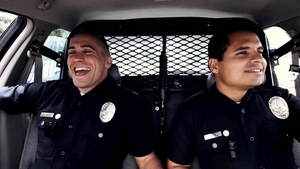
What’s better than one GST staff writer’s perspective on a film? How about two? For this round of Double-Take reviews, Bill and Andrew crack their knuckles and dig into David Ayer’s latest street cop drama, End of Watch:
By Andrew Crump:
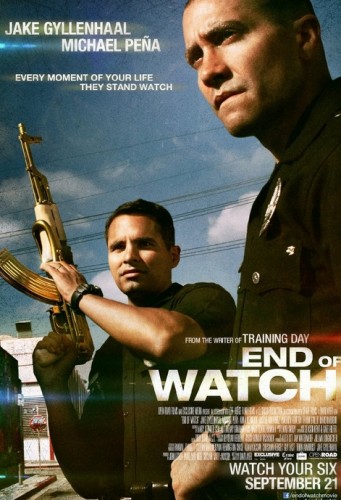 If insanity can truly be defined as doing the same thing over and over again while expecting different results, then Einstein would’ve immediately pegged David Ayer as a bona fide lunatic. Since his runaway success with Training Day in 2001, Ayer has done nothing but write and, more recently, direct crime films set in Los Angeles at large or South Central in the specific, crafting narratives that are embedded either in gang or police culture. Matters of corruption and loyally crop up with regularity in each, and while some prove more than satisfactory (Dark Blue), most of them are disposable knock-offs of his preceding works; one might go so far as to see them as attempts at recapturing his success from eleven years ago.
If insanity can truly be defined as doing the same thing over and over again while expecting different results, then Einstein would’ve immediately pegged David Ayer as a bona fide lunatic. Since his runaway success with Training Day in 2001, Ayer has done nothing but write and, more recently, direct crime films set in Los Angeles at large or South Central in the specific, crafting narratives that are embedded either in gang or police culture. Matters of corruption and loyally crop up with regularity in each, and while some prove more than satisfactory (Dark Blue), most of them are disposable knock-offs of his preceding works; one might go so far as to see them as attempts at recapturing his success from eleven years ago.
Then again, maybe Ayer is neither loony nor yearning to reattain his past glory. Maybe he’s just a perfectionist trying to get the same story just right. If so, End of Watch certainly represents a significant step up from much of his post-Training Days efforts, and could well be the best story he’s delivered since that film’s release. But that just makes the problems with the film’s presentation that much more visible. If the faux-verite styling of found footage can heighten the terror of a horror film when done well, then it stands to reason that it could be used to similar effect in a gritty street cop drama, and to End of Watch‘s credit, sometimes the rampant shaky cam works. Conversely, it more often doesn’t, and so the story of officers Brian Taylor and Mike Zavala loses much of its impact to Ayer’s appalling visual grammar.
And that’s a shame, because Taylor (Jake Gyllenhaal) and Zavala (Michael Peña) share a wonderful, moving brotherhood with one another. We’re given to wonder about the nature of their bond courtesy of an abrupt, violent first impression, but they’re not men who find common ground only in police work and shoot outs. Quite the contrary; alone, the pair talk more about family life and their romantic relationships than they do about patrolling their beat. They rag on each other. They play pranks on their fellow cops. They share their concerns, their hopes, and their fears with one another. Certainly, they take their profession seriously– if the opening sequence establishes anything, it’s that Taylor and Zavala face death every day of their lives– and End of Watch has no shortage of action beats in which these two softies prove why they’re such hotshots in their precinct. But this isn’t a film obsessed with the wholesale glorification of tough-guy macho heroics. It’s a movie that tells us it’s okay for men of their bent to have real emotions.
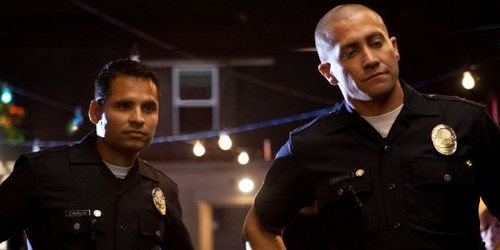
That study unfolds in a sprawl which reflects the timbre of Ayer’s narrative. End of Watch has a reliable through-line, but it’s loosely structured; think Polisse but removed from Paris, slightly less scattershot, and with fewer characters. And with a more tangible overarching plot. Maïwenn’s masterful, humanist police drama is fueled almost entirely by her characters, whereas Ayer instead throws his two South Central cops into the path of a Mexican drug cartel. Turns out that Taylor and Zavala are so good at what they do that they earn the ire of an unnamed gang involved in narcotics peddling and human trafficking. The yarn Ayer spins out of this conflict is satisfying enough, and both Gyllenhaal and Peña give performances that are nothing short of outstanding– End of Watch very much rides on their chemistry– but all of the film’s best merits are ultimately undone by sloppy construction and misfired aesthetics.

By Bill Graham:
Sometimes a film is so utterly well-executed that even if it explores things you have seen before, they end up profoundly affecting. A large part of what makes End of Watch such an enjoyable film is the two leads, Jake Gyllenhaal and Michael Peña, who will put you through the gamut of emotions as you enjoy the rollercoaster ride. Cop dramas have a habit of falling into well-worn tracks, but the director manages to smartly steer out of those ruts. Because of that, there is an intensity to the entire runtime that permeates through the patrols and even the downtime sequences. Put simply, this is just a well made film that is incredibly affecting.
When the duo stumble upon a cartel’s storehouse, things start to take on a horror atmosphere that is unexpected and refreshing. The tension builds and you fully expect someone to jump out of the dark corners. Yet, that doesn’t happen, and instead of being a letdown it feels more like a lesson. This isn’t a horror film. This is based on real scenarios and the sad fact of life that as a cop, doing your job well can make you a target. That realization is what hit home with me. Of course, this isn’t real life, but lost in the film, your mind tends to add gravity to the actions and results.
In the end, that’s one of the best things I can say for this film. I was transported. I felt why they had to break up the intensity with their humor. Laughter is often the result of stressful situations because the opposite direction just simply isn’t something palatable. Depressed, grim comments in a grim situation? No thanks. But humor. That makes the job stomachable, even if it takes a few Red Bulls to keep you going. The other realization is that these two actors are
very different in background and outer appearance. That translates onto film. You are unlikely to choose your partner from a litter. You are given one, and they either work or they don’t And that’s a feeling you get through the film. They learn from each other. They have things to say that the other person listens to.
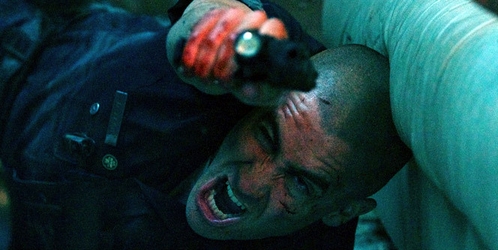
All of this, of course, is a part of what makes the overall experience such a quality film. They build blocks of foundation. And as the stakes are raised, we find we care what happens to them. Whether they get punched in the face, breakup with their girlfriend, or get shot at, we care. Small to big, doesn’t matter. We are invested. By the climactic conclusion, we are so into these characters that the finale becomes incredibly affecting. And in the end, the production values and everything else falls to the wayside. A pretty film doesn’t make you care. Great acting can, however, unlock a film’s potential, and my hat is off to Michael Pena and Jake Gyllenhaal for giving me a guttural reaction to their exciting, intense police thriller.

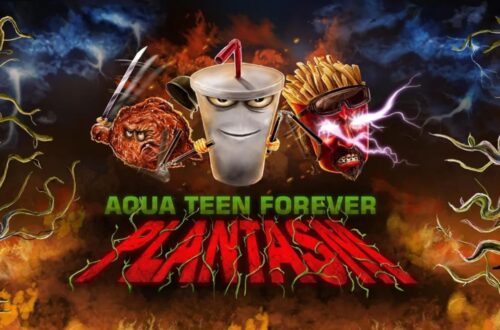
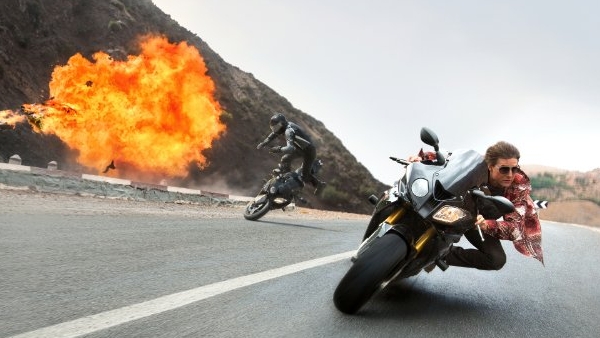
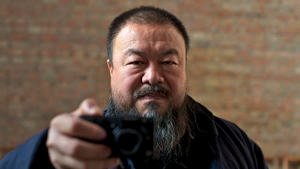
8 Comments
Andy Swinnerton
Interesting differences between your opinions, I feel like my standard for success for this movie will be the performances of the two leads so I’d guess that my score will be more in line with Bill’s but who knows
Andrew Crump
It’s certainly not bad by any stretch of the means, and yes, if your standard for success is defined by the performances of Gyllenhaal and Pena, then you’ll definitely get your money’s worth. For me, the least complimentary elements– Ayer’s one-note sensibilities as a director/writer, the horrendous camerawork– brought the whole thing down a peg or so.
Filter this through regular camerawork, and I honestly could have given this a solid 3. The substance is very substantial. It’s the presentation that hurts it for me, point blank.
Grady May
I saw it last night and I am more inclined to agree with Bill’s rating. It was a 4/4 for me until the last 10 minutes. I’m not sure what happened in the editing room, but something went awry. The camera work was a mix of found footage and other non-stable shots, which doesn’t work well for some. However, I felt like the shots themselves drew you into the action and made it feel more like a behind the scenes documentary (uncensored). There were other times when more stable camera work when have been preferable; completely agree. But, all-in-all I was glad I was able to see the movie. I would recommend it to anyone.
Andrew Crump
You know, this could easily have been a 3.5 for me if Ayer showed any sense of craft here. I just think that his filming approach is somewhat lazy. Not that shaky faux-doc camerawork can’t be effective, mind, but here the aesthetic didn’t make me feel the action, and I think that’s how this sort of found footage technique is best applied.
But Gyllenhaal and Pena are both so legit here that I could almost have just given the aesthetic a pass. They should co-star in more movies together. I somehow doubt that the portrait of friendship they create here can just be chalked up to lightning in a bottle.
Fogs
This movie definitely relies on the strength of the two leads… The partner relationship is obviously the primary focus of the film. The plot isnt exactly anything memorable. So it was nice to see you both touch on that aspect of the movie.
Andy, I concur, the style definitely is a bit of a detriment… I actually disliked the excuses they were using to try to integrate cameras to be even more annoying. JUst film the style you want and dont get caught up in trying to make it “Found footage” cmon…
Andrew Crump
First, thanks for stopping in Fogs. Always good to hear from you.
And while I agree on the plot, the fact that it’s so boilerplate doesn’t much bother me. I think boilerplate stuff like this can be elevated by the other elements of the film– you either have a great script, great performances, or great craft. In the case of End of Watch, Ayer has a decent script, polarizing craft (I really dislike it but it clearly works for others), and two fantastic central performances. (Plus some good side performances from people like Anna Kendrick and Frank Grillo.)
I think I might have been harder on this movie than I meant to. I would recommend it to any fan of dark cop dramas solely on the strength of Gyllenhaal and Pena’s acting. They’re wonderful. I want to see them in more films together. But the aesthetic hurt things for me– just maybe not as much as I let on in this review.
Colin "Fitz" Biggs
The rapport that Gyllenhaal and Pena shared was enough for me to overlook some of the film’s flaws. While the camerawork may not have worked always, it was an ambitious decision.
Andrew Crump
I can’t fault him for his ambition, true. I just wish it had turned out for the better. But like I’ve said, this is an easy recommendation just because of Gyllenhall and Pena– you’re right, they really are quite excellent.